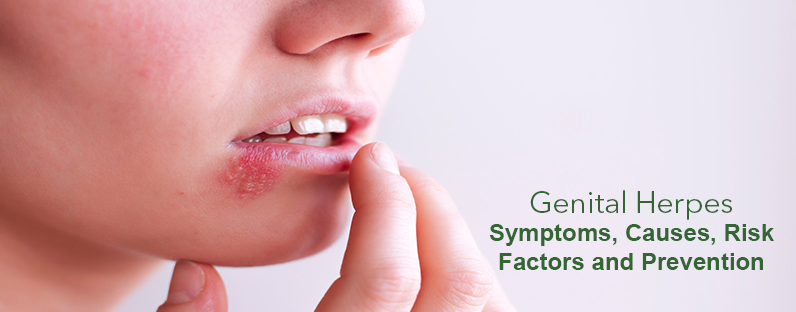Genital Herpes- Symptoms, Causes, Risk Factors and Prevention
Genital Herpes is a natural, sexually transmitted infection caused by the Herpes Simplex Virus (HSV). The primary way the virus spreads is through sexual contact. The virus remains dormant in your body after the initial infection and can reactivate many times a year. From here you can know the symptoms, causes and the precautions tips of Genital Herpes.
Genital herpes, in your genital region, can cause discomfort, scratching and sores. But you do not have any signs of genital herpes. If infected, you can become infectious even if you do not have visible sores.
Genital herpes can’t be healed, but medications can relieve symptoms and reduce the risk of infecting others. Condoms can also help prevent the spread of infection with genital herpes.
Genital Herpes- Symptoms in Men and Women
Most people with HSV do not know they have it because they have no signs or symptoms or because their symptoms and signs are so mild.
Symptoms may start, if present, about two to 12 days after exposure to the virus. If you experience genital herpes symptoms that can include:
- Down or scratch: Until the infection clears, you can feel pain and tenderness in your genital region.
- Tiny red bumps or tiny white blisters: After infection, these can appear a few days to a few weeks.
- Ulcers: This can develop when ruptured blisters and ooze or bleed. Ulcers can make urinating painful.
- Scab: As ulcers heal, skin can crust over and form scabs.
You may have flu-like signs and symptoms during an initial outbreak, such as swollen lymph nodes in your groin, headache, muscle aches and fever.
Read Also:Polycystic Ovary Syndrome (PCOS) – Symptoms, Causes And Complications
Differences in symptom location
Sores appear in the body where the infection has reached. By touching a sore and then rubbing or scratching another part of your body including your eyes you can spread the infection.
Men and women can develop sores on the:
- Buttocks and thighs
- Anus
- Mouth
- Urethra (the tube that allows urine to drain from the bladder to the outside)
Females may also develop sores in or on:
- Vaginal area
- Outer genitals
- Cervix
Males may also develop sores in or on the:
- Penis
- Scrotum
Recurrences are common
For every person the genital herpes is different. The signs and symptoms could recur, off and on, for years. Many people experience numerous episodes each year. However, the incidents are less common to many people as time goes on.
Shortly before sores develop during a recurrence, you may feel:
- Burning, tingling and scratching, where the infection entered first in the body
- Lower back, buttocks and legs pain
However, recurrences are typically less painful than the original infection, and sores generally heal faster.
Read Also:Premenstrual Syndrome: Symptoms, Risk Factor, And Treatment
When to see a doctor
See your doctor if you think you have genital herpes — or any other sexually transmitted infections.
Causes of Genital Herpes
Two types of infections the herpes simplex virus can cause genital herpes
- HSV-1: It is the form commonly causing cold sores or fever blisters around your mouth. HSV-1 is often spread by skin-to-skin contact although it can spread during oral sex to your genital region. Recurrences are slightly less common than with HSV-2 infection.
- HSV-2: This is the type which is the sort usually causes genital herpes. The virus spreads by skin-to-skin contact and sexual contact. HSV-2 is very popular and highly infectious, whether you’re getting open sore or not.
Since the virus dies rapidly outside the body, it is almost impossible to get the infection from contact with toilets, towels or other items that an infected person uses.
Risk factors
Your chance to become infected with can increase if:
- You are a woman: Women have more chances than men to have genital herpes. The virus is sexually spread more easily from men to women than it is from women to men.
- You have multiple sexual partners: Any additional sexual partner increases your risk of exposure to the virus which causes genital herpes.
Complications
Genital herpes related risks may include
Other sexually transmitted infections: Having genital sores excess the risk of transmitting other sexually transmitted infections, including AIDS.
Read Also:HIV/AIDS-Overview, Symptoms, Causes And Prevention Tips
Newborn infection: Babies born to infected mothers can become exposed to the virus during birth. This can lead to neonatal brain injury, blindness or death.
Problems with the bladder: In some cases, genital herpes related sores can cause inflammation around the tube that delivers urine from your bladder to the outside world (urethra). The swelling may close the urethra for several days, requiring that a catheter be inserted to drain the bladder.
Meningitis: In rare cases, HSV infection triggers to inflammation of the membranes and cerebrospinal fluid that covers the brain and spinal cord.
Inflammation of the rectum: Genital herpes can cause inflammation of the rectum lining, particularly in men who are having sex with men.
Prevention
Recommendations for avoiding genital herpes are the same as recommendations for avoiding other sexually transmitted infections: Abstaining from sexual intercourse or limit sexual contact to only one person who is safe from infection. Short of that, you can:
- Use a latex condom for any sexual activity with your partner
- Avoid sex if either partner has herpes outbreak in the genital region or elsewhere
Pregnancy precautions
Tell your doctor that if you are pregnant and know you have genital herpes. If you think you might have genital herpes, ask to get it checked.
Your doctor may suggest you start taking herpes antiviral medicines late in your pregnancy to try to avoid an outbreak around delivery time. If you are having an outbreak when you go into labour, the doctor would possibly prescribe a cesarean operation to minimize the risk of transmitting the infection to your infant.

